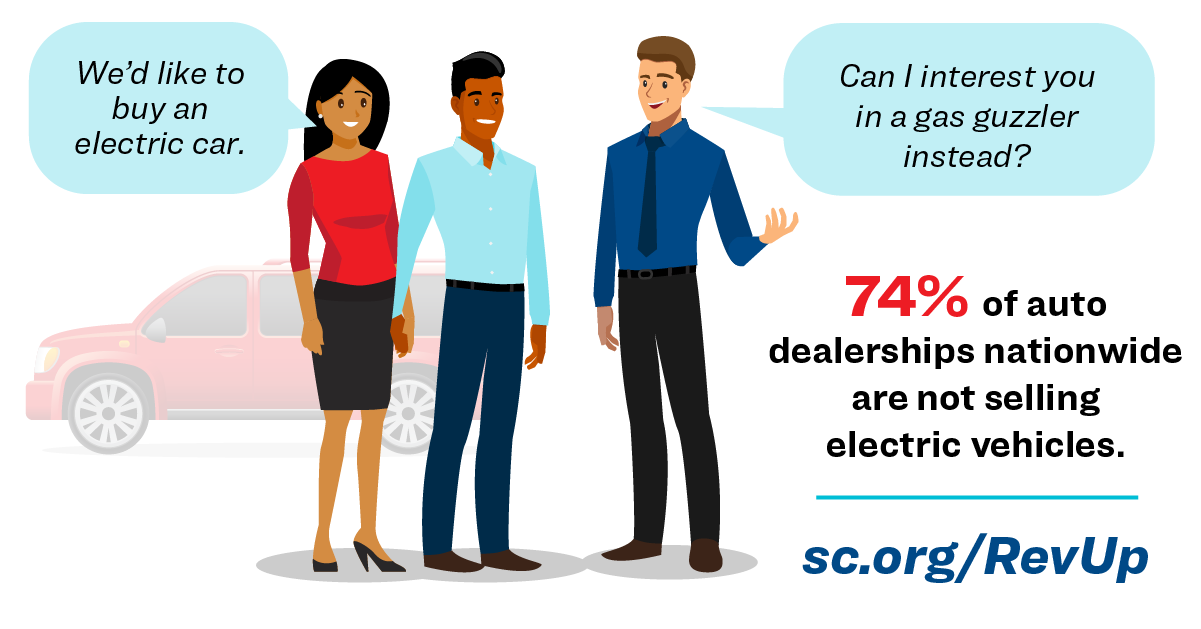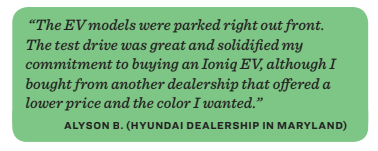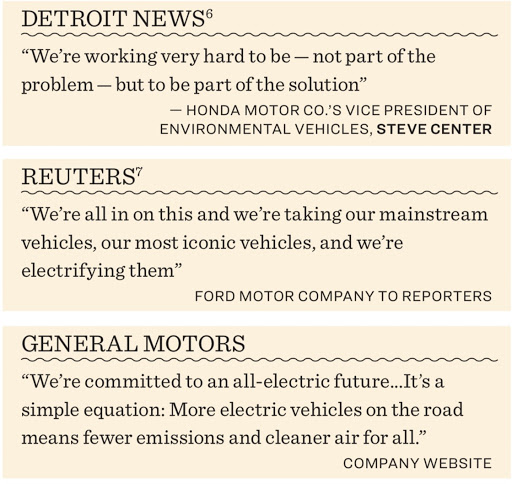
The Sierra Club just released a new nationwide report on the electric vehicle (EV) consumer shopping experience and the findings demonstrate the hypocrisy of automakers and auto dealers.
In 2016, we published a study that surveyed how the auto industry was selling electric vehicles to consumers in the 10 states that had adopted the Zero Emission Vehicle (ZEV) standards at the time, which requires automakers to sell an increasing amount of EVs. The results from the report highlighted how the auto industry heavily favored selling its gas-powered vehicles and failed to provide consumers with a strong EV shopping experience.
A lot has changed in the world since 2016. The Trump administration took office and launched an attack on the historic clean car standards, important climate and consumer protections that make cars more fuel efficient, less polluting, and cheaper to drive. The administration is also taking the unprecedented step of trying to take away California’s authority to set stronger emission standards, which 14 states and the District of Columbia follow.
Automakers like General Motors, Toyota, and Fiat-Chrysler have been the target of public outrage since the news broke recently that they are siding with the Trump administration in its plan to eviscerate the clean car standards and take away the ability of California and the other “clean car states” to enact strong clear car and clean air standards. These include standards requiring automakers to sell increasing numbers of electric vehicles. (The Sierra Club and our partners are challenging many of these unlawful actions in courts, while advocating for the switch to electric vehicles all across the country.)
But some things have stayed the same, like the auto industry doing the bare minimum to promote electric vehicles at a time when it's more crucial than ever to tackle transportation emissions.
This year, we expanded on our efforts to analyze how EVs are being sold in the US and conducted the first-ever nationwide investigation of the EV shopping experience. Over 500 volunteers were recruited, and together they surveyed 909 auto dealerships nationwide in all 50 states. The findings are eye-popping:
○ 74% of auto dealerships nationwide aren’t selling electric vehicles.
○ In 28% of dealerships visited, salespeople provided no information at all about how to charge an EV; in 31% of dealerships visited, salespeople did not provide any information on state and federal incentives.
○ When volunteers asked to test drive an EV, the vehicle was insufficiently charged and unable to be driven 10% of the time.
○ Of the dealerships that sold EVs, more than 66% did not display EVs prominently, with vehicles sometimes buried far in the back.
○ Among automakers, Tesla was reported as providing the best consumer-shopping experience, with an average satisfaction score of 4.5 out of 5 and Chrysler was reported as providing the worst consumer shopping experience, with an average satisfaction score of 2.9 out of 5.
It’s not all gloom and doom. Dozens of our volunteers reported a five-star EV shopping experience -- demonstrating that it is possible for automakers and auto dealers to get it right. And some of our volunteers even reported that they bought an EV -- joining the more than 1 million Americans who have made the switch in recent years.

The auto industry likes to claim that there isn’t a demand for EVs, and that consumers just aren’t interested. But a recent study by Consumer Reports and Union of Concerned Scientists found that nearly two-thirds of prospective US buyers are considering purchasing an electric vehicle in the future, spanning across income, region and ethnicity. EV sales went up 81% in 2018 over the previous year. Ride and drives and educational events like National Drive Electric Week are drawing more and more people out every year to check out electric vehicles for themselves.
The 2018 report from the Intergovernmental Panel on Climate Change (IPCC) made it clear: We can’t afford to sleep through a blaring wake up call. Despite the widespread evidence of the climate crisis and the impact of transportation on greenhouse gas emissions, the US auto industry is largely sticking its head in the mud -- slowing down the growth of low-emission and zero-emission vehicles that help to cut emissions and improve air quality for communities.
Time and time again, automakers’ claims of sustainability -- like the ones below -- amount to nothing more than greenwashing. Our report solidifies that their grand plans for EVs ring hollow on the ground.


Unfortunately, as our report shows, consumers are still facing major barriers when shopping for an EV, from being unable to find EVs on lots, interacting with salespeople who haven’t been trained on financial incentives and basic EV technology, and sometimes even being encouraged to buy a gasoline-powered car instead.


Not only is the auto industry putting up barriers for consumers at dealerships across the nation, automakers aren’t seriously advertising their EVs. Recent analysis by the Northeast States for Coordinated Air Use Management (NESCAUM) analyzed the ad spending of six major automakers -- General Motors, Toyota, Nissan, Ford, Fiat-Chrysler, and Volkswagen -- and found that the auto industry spends the bulk of its ad dollars promoting gas guzzlers, and just a fraction of on EVs. Automaker advertising for gas guzzlers was 28 times higher than for EVs nationwide, and 10 times higher in the Northeast and California markets.
How will we get to the electric future we need when automakers are barely lifting a finger to sell EVs, while they hold onto the same false narrative that consumers are uninterested? The auto industry’s hypocrisy is clear, and it’s time automakers step up their game and back up their promises of clean cars with real action.